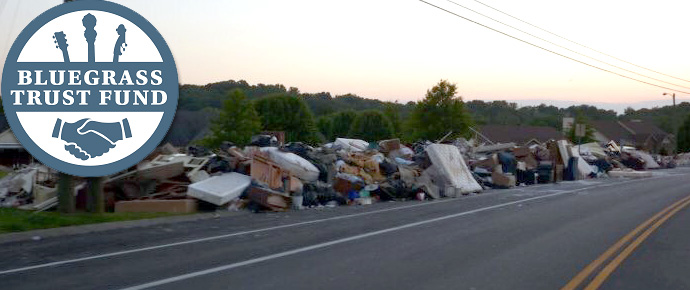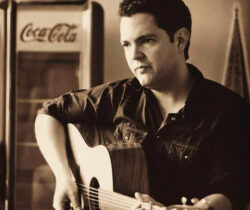
A lot of our readers are regular attendees at the annual World Of Bluegrass Convention, hosted each year by the International Bluegrass Music Association. Many others enjoy following what goes on there here at Bluegrass Today with the stories and photo galleries which we publish on site.
The convention, which is held now in Raleigh, NC, serves as a business meeting for the bluegrass world, an opportunity for talent buyers to hear fast-rising talent in one place, and for newer members of the music community to learn from industry veterans at a variety of seminars and workshops scheduled over the course of three days. For 2017, the event will take place September 26-28 at the Raleigh Convention Center, with a gala awards show to close things out on Thursday the 28th.
Following the Business conference and Awards Show, attention shifts to the Wide Open Bluegrass Festival, held in the adjacent, outdoor Red Hat Amphitheater. If you had attended Word Of Bluegrass when it was put on in Louisville or Nashville, you may recall this festival being billed as FanFest, and held within the convention center hosting WOB.
There have been some changes in how the event is run over the years, but its primary purpose has not deviated from the initial vision. Wide Open Bluegrass raises money for the Bluegrass Trust Fund, which exists to assist bluegrass artists and industry people in need. In fact, the goal of having such a fund was a major motivating factor in creating a bluegrass association back in 1985 when the IBMA was formed.
It seems that everyone who plays, listens to, or works in bluegrass understands that only the rare artist or record label makes what might be called “serious money” in this business. A decent living can be made if you work hard and have a vision, but putting aside savings for a rainy day is tough, and dealing with sudden and unexpected expenses can put a major strain on the people we depend on to enjoy bluegrass music.
Sadly, the Bluegrass Trust Fund is one of the least publicized services that the IBMA provides, and not many people outside of the organization fully understand its role. But proceeds from the Wide Open Bluegrass festival are the primary funding source for the Fund. In 2016, a total of $38,992 was transferred from the IBMA to the Trust Fund, and many thousands are distributed anonymously each year to those working as a professional in the bluegrass industry, anywhere in the world.
On their web site, the IBMA describes such professionals as follows:
Professionals include, but are not limited to, artists, composers, broadcasters, media representatives, event producers, agents, educators, managers, and employees of record companies. Families of such individuals may also qualify for assistance.
Many people who do recognize the work of the Trust Fund think of it primarily as serving the medical needs of elderly musicians, and it does serve that purpose on occasion, but applications can be submitted for any emergency or circumstance where an imminent need occurs.
Donations from the Fund are given anonymously, to protect the privacy of the recipients, but we have a number of stories we’d like to share this summer from people who are willing to tell how the Trust Fund has helped them.
US news dedicated a lot of attention to flooding in Nashville during the spring of 2010, when the Cumberland River leapt its banks after 19” of rain fell over several days, causing 10 deaths in Davidson County and many more through Tennessee, Kentucky and other nearby states. More than $2 billion in property damage was caused in the wake of the floods that resulted, with homeowners and businesses equally affected, most of them outside the river’s floodplain.
Among those whose home was gutted was Ashby Frank, a young bluegrass artist who was working at the time as a sideman with Alecia Nugent. Frank was on the road with Alecia in California when the floodwaters rose and covered the first floor of his home in Nashville with 6-8” of water. The water quickly receded, but the damage to his house, built in the 1960s, was extensive.
Ashby says that it was quite a sight when he returned home.
“All the furniture was ruined, and I had to replace the floor and subfloor, plus all the ductwork. My house wasn’t in the floodplain, so federal flood insurance wasn’t available.
I had just left my gig with Special Consensus a few months before, and I couldn’t get a federal emergency loan since I couldn’t show them pay stubs.”
He began to talk with contractors and receive estimates for repairs that seemed to grow larger every day.
“The city threatened to condemn my house unless I threw out the central air conditioning. It seemed like every day it was going to be another $2000, and that went on for weeks.”
Fortunately, Ashby’s sister was in the house when the water started rising, and she was able to get all his instruments off the floor, but the costs for getting the house habitable again had spiraled to roughly $65,000.
“The Trust Fund was the real thing that saved me from losing my house, or becoming completely insolvent. When you have to spend $30,000 on credit cards in a few weeks, you suddenly find yourself facing a big hole. I started to freak out a bit.
Dan Hays reached out to me personally. It was the easiest process you could imagine.”
The music community in Nashville helped him out a great deal as well. Tom T and Dixie Hall let him stay in their guest house for part of the time his house was being repaired, a period of several months.
“I had so many people from the music world who offered to help. Darren Shoemaker helped a lot. He and I pulled up the old hardwood floor. A lot of friends came to help. My parent’s church in North Carolina came to help put the new floors in.”
But because he used credit cards for some of the work, he didn’t qualify for any of the money raised at various Nashville celebrity events.
Ashby says that he is still paying down credit cards 7 years later, and spent three years working on a cruise ship to earn the money to do so. It wasn’t the job he wanted, but he did what he had to do.
He wanted to tell his story so that people understood that the Bluegrass Trust Fund is for real. Both MusiCares, an agency of The Grammy Foundation, and the Trust Fund were important parts of his recovery. Of the nearly $75,000 he had to find to get his house repaired, Frank says that the largest donation came from IBMA.
“I’m living proof that if you have a need, and are trying to do the right thing, they are there to help you.”
These days, Ashby is working as a free lance musician, filling in as needed with top groups like The Earls Of Leicester, The Crowe Brothers, and playing in town with The Likely Culprits. He is also one half of The Darrell Brothers, a bluegrass comedy duo whose quirky videos have been viewed hundreds of thousands of times online. The Brothers are hopeful of starting up a Darrell Brothers podcast, and are exploring some possible television opportunities.
More information about the Bluegrass Trust Fund can be found online, including applications for assistance and information on how you can donate directly.
Tickets for the Wide Open Bluegrass Festival can also be purchased online, with discounts offered to IBMA members. Performances are scheduled by Hot Rize, Travelin’ McCourys, Doyle Lawson & Quicksilver, Balsam Range, Sister Sadie, Flatt Lonesome, Lonesome River Band, and many more. If you can’t attend, consider buying tickets for some young pickers who would love to see the show, knowing that a large part of the cost will end up with the Trust Fund.









